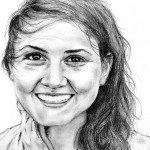In most of the stories I tell, something goes wrong. There’s the one about the time I hitchhiked with a broken leg and no water or cash in a rural part of Chile. Or the time I ran out of water in the Grand Canyon. Also, the time I got lost on a glacier in southeast Alaskan fog. Most of these stories I tell happen during breaks. They’re a highlight reel of a particular life I fancy myself to lead — one that’s adventurous and free.
Much, of course, happens outside of this reel though. In fact, most of my breaks have happened this way: There have been long books, long Skype calls home, long conversations about transit options, long bus rides wondering whether I should ask the driver where to get off, long walks looking for coffee shops with Wi-Fi, long mornings wishing I had something other than instant coffee, long naps. But memory is selective. I tell the highlights, and eventually, forget the rest.
I tell the story of the highlight reel because I want to remember it — the fiasco, the stupidity, the pain. I want to keep those moments of ecstatic presence, when I couldn’t reel forward or backward in time. The challenge helped me pay attention. I think we see and feel more when things are going wrong.
I felt my skin clench after dropping from a rock into 58-degree water, tiny bubbles of water frosting my goosebump-coated legs and clumping my eyelashes together. I saw the frozen patterns of teal waves in a Colorado lake during a blizzard. I felt my shoulder blade when mosquito bites made my skin like Braille after I slept too close to the netting of an emergency bivouac.
It’s only been a week since break. Just last week, I was in my tent, snuggling with my frozen Camelback. Since I haven’t been able to live that kind of story with my skin for a few days, though, I’ve kept those past lives alive by talking about them.
It’s spring right here, though; I can see it through the squares in the library window beyond my laptop screen. I felt sun on my face today, saw crocuses push through the dirt lining the sidewalks, heard songbirds trickle melodies in the bushes. Another season has arrived with the equinox, too: Bucket List Season.
In this season, especially for seniors, summer’s start serves as a deadline. It inspires us to stay up late, like our other deadlines, but with this one, we binge on the lives we didn’t get to lead during our past four years. We’ll leave our comfort zones; we’ll try new things; we’ll live the stories we’ll tell over and over later. We’ve procrastinated long enough.
We will pilgrimage up to the farm for pizza and roll down the hill until the gravel driveway crunches below our backs; we’ll plan to watch the sun rise from West Rock, get there too late and have brunch at Bella’s instead; we’ll cartwheel on Cross Campus, have floating dance parties in the stacks, go to Wednesday night Toad’s. We’ll break routine, realizing designated “breaks” aren’t the only chance to do so, and later forget how much routine reigned. We’ll tell stories of Yale in which we star as adventurous and free students, engrossed in the glamour of our exploits, recounting the details of the calamities that ensued.
I don’t have too many stories when things have gone wrong here: Getting scraped by the underbelly of highways while ducking in a canoe was kind of exciting; once the Yale police told us not to go streaking; this winter I ran around in the blizzard and the wind was a big thing. I think I can do better, though.
The few times during breaks when I’ve said “yes” to the adventures that have landed me in precarious situations have defined those trips. The memories have expanded. I want to say “yes” in the same way here. I know that what I say yes to will expand as well, blotting out the nights I have spent responding to emails and drinking too much coffee. I want to open myself up to the possibility of something going wrong. I want to do the things we’ve marked as off-limits.
So, here’s a start to a bucket list:
Run around New Haven with no map and no phone and see where you end up. Research a paper you have no idea how to make into an argument and won’t be able to write in one night. Sleep outside. Do something cool you tell no one about. Ask someone out. ________________.
Diana Saverin is a senior in Berkeley College. Contact her at diana.saverin@yale.edu .








